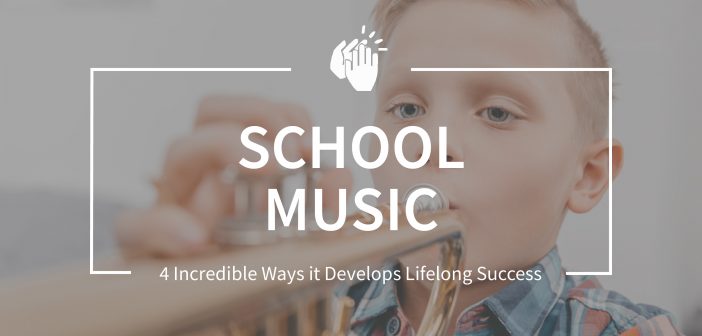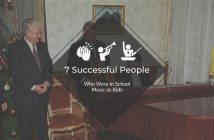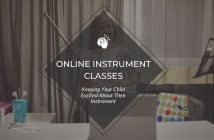Kids need music.
Simple as that.
Why else do parents sing to comfort their infants, put on lullabies for their toddlers, or play sing-along DVDs for their elementary-aged kids?
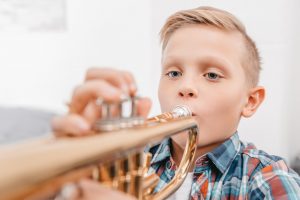 But there’s a fundamental difference between exposing children to music and educating them in music.
But there’s a fundamental difference between exposing children to music and educating them in music.
I would argue that educating children in music can not only be beneficial in their day to day lives but also set them up for an incredible future.
March was Music in our Schools month – a nationwide effort to bring attention to the importance of school music!
I want to do my part by pointing out four incredible benefits your child will experience through a quality school music program. The things your child will learn last far beyond their childhood years. Here’s why –
1. School Music Teaches Students Reasoning and Logic.
As an adult, I think and reason every single day. We make decisions about work, our homes, our families and a million other things. But where does that skill come from? Was it through puzzles we solved as a child, or riddles our grandparents told us?
Children in school music education have a leg up in learning how to think logically.
Recent evidence has shown that training in music physically develops the left side a child’s brain – the side involved with processing language, analytic thought and logic.
When a child begins training in a school music class, they use the left side of their brain to process pitch, tempo and the emotion involved in music. Music education has the power to stimulate and rewire the brain’s circuits. A musically-trained child can use their left brain much earlier than children who aren’t in any form of music education.
Meanwhile, those school music lessons are also stimulating the right side of the brain, known for spatial awareness and creativity.
It’s also teaching your child the ability to combine different parts to create a whole. This means they could not only play a measure on the piano, but also be learning how to think through everything they need in their backpack for the next day.
School music classes also develop amazing motor skills and creativity – all things we need as adults.
Music in our Schools Tip: Expose your children to music from a young age. If they are pre-kindergarten, play music in your home. Encourage them to sing a song they learned in daycare or preschool. Take a few moments out of your day to play with them as they beat a drum or play on a toy xylophone.
As your children move into school, be intentional when asking about their music class, and ask them to share what they are learning!
New to Kincaid’s? Start here.
2. School Music Teaches Students to Strive for Excellence.
We all want our children to be the most successful people they can be. As our children grow, so do their responsibilities – between schoolwork, work at home, and social demands.
Children in school music develop a sense of craftsmanship while studying music, beginning to take pride in their work. This skill translates directly to the rest of their lives.

Students in school music will go from accepting good to striving for great.
One study shows that elementary students in great school music programs scored around 22 percent higher in English and 20 percent higher in math scores on standardized tests, when compared to students in low-quality music programs.
This shows how students in school music programs start practically transferring those skills over to other subjects like Math and English, among others.
When students learn music and take pride in it, the change is evident even in other subjects!
Children learn to take ownership of their music by practicing consistently, trying out new sounds, and even taking care of their instruments. This is a huge skill for a young child to learn.
Kids in school music education carry that skill over to the rest of their lives, taking greater ownership of their grades, chores and other tasks.
Music in our Schools Tip: Test it out – keep a record of your child’s grades before and after they enter a music class. Do you see any improvements? If so, celebrate with them!
Ask their teachers about any improvements they have seen outside of test scores, such as quality of classwork, interactions with classmates and attention span.
3. School Music Puts Students in Sync With Themselves and Others
As adults, we know that life is hard. I know I wasn’t prepared for the emotional toll some of my experiences would take on me. What if our kids could have a better grasp of their emotions as they grow?
A child in school music education will develop earlier socially and emotionally.
Music can be used to change our emotions: To soothe, relax, stimulate, excite, or make us happy or sad.
Exposing children to the emotional power of music at an early age is so beneficial! It can help them identify what they are feeling and relate to the feelings of others.
Research shows that even infants that are six months old show development of “prelinguistic communication” and social behavior after just months of musical experiences.
If an infant’s emotional and social behaviors can already be impacted through musical training, then imagine how ready that same kid will be for the real world after fifteen years of it!
There is also a side to music that involves working with others. Children form notes in harmony with one another. They join their voices to singing the same words, or move their bodies to the same rhythm.
The cooperation between students and teacher is so beneficial to social development. School music helps students to be more attentive, listen better and work in groups better than children who are not in it.
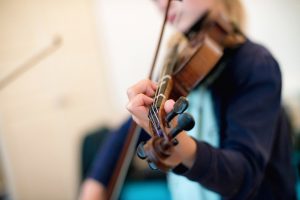
Here’s something else to consider: studying music by artists of different cultures can help our kids begin to understand people who are different than they are.
Because music from different social groups always reflects those groups, your child will probably like one kind of music than some other music. It also depends on what kind of music they are most exposed to in the home.
School music programs allow kids to study, and even recreate, music from another culture. It also teaches them to accept something different than what they’re used to.
Music in Our Schools Tip: Help your kids bring the social and emotional aspects from school music class into the rest of their lives by engaging with them each day. If you play music in the car, ask them how it makes them feel.
Try to make up a happy song together, and then a sad one. See how they respond and watch how they become more in touch with their own emotions – and even the emotions of others around them.
4. School Music Prepares Students for Success in the Future
What makes a person successful? Wealth, status, family? How about the simple ability to relate to others and perform skill(s) that they are passionate about?
School music prepares your child for their adult life. The lessons that your kids learn when actively engaging with music – from how to think, to spatial awareness, to paying attention, to interacting with classmates – it all translates into a well-rounded child becoming a well-rounded teen, becoming a well-rounded adult.
A study of children who were heavily involved in a music class were also the ones who had better attendance. They also paid attention in class and stayed on task during the lesson.
Our kids’ brains rewire through the process of music education, and the benefits are absolutely incredible.
When children grow up with a school music education, it pushes them toward success.
Without musical training, the skills we hope to see in our children may or may not actually develop. School music helps kids – even from the youngest time in their lives – learn the skills for a successful present and an even more successful future.
Music in Our Schools Tip: To support your child’s (and their peers’) musical education, become involved in the music program at their schools. Volunteer your time to help with programs and concerts. Ask their music teacher if you can help in or outside of class. Have them practice their school music in front of you.
And applaud them!
Each note brings your child one step closer to success!
So what can you do to make every month Music in our Schools Month?
Parents
The most important thing you can do for your child in music education is to start them young. Even while they are newborns, be intentional about playing music for, singing to, or dancing with them. This will begin engaging their brains.
Once they are school-aged, talk with your child about their school music class. Begin reinforcing from school to home by volunteering your time with the music class at school, and helping them practice their music at home.
Band Directors/Music Educators
Know that what you are giving the children you teach is much more than an hour’s worth of trying to make harmony out of cacophony. You are literally rewiring their brains. Encourage that!
When you see a child begin to develop better social skills, pay more attention, or improve grades outside of your class, get excited with them – and let those little victories encourage you to keep doing what you do.
Students
You may not know it, but each day you play music your brain is changing and strengthening! Make sure that you work hard, pay attention, and offer help to others in your music classes.
Teamwork, after all, does make the dream work. (*groan* ![]() – I know, I know…)
– I know, I know…)
Talk to your parents and teachers about the things they see you improving on as a result of school music class – whether it’s grades, social skills, or even your attention span. They’ll want to celebrate with you, so let them!
Have you seen firsthand how music enhances the development of your child? Are you interested in learning more about how to get your young child involved in school music education?
Parents of grown children, do you think your children are more successful because of school music programs in their younger years?
Let us know in the comments!
All photos used under CC0 license.

